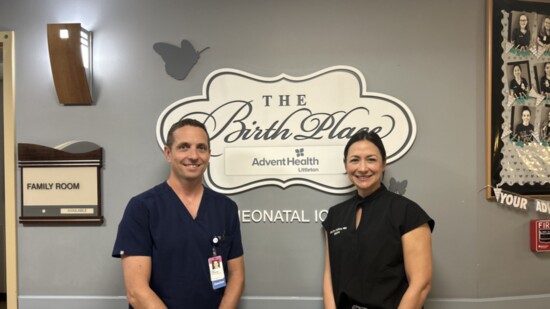Sometimes, life brings blessings out of nowhere. Other times, blessings are shrouded in uncertainty and challenge. For Sandra Hazzard, the arrival of her son Max was a mixture of joy and unexpected trials she didn’t anticipate.
Max's entry into the world wasn't expected to be tough. Sandra’s pregnancy had been progressing smoothly, and like many parents, Sandra anticipated a delivery without complications. But at her 32-week appointment, a benign heart arrhythmia was detected, leading to increased monitoring. By 37 weeks, movement had slowed, and they decided to induce Max early.
Three years prior, Sandra and her husband, Brian, were pregnant with their second child, Bennet. Approaching the day of his birth, the Hazzards didn't have reason to be concerned. But tragically and unexpectedly, Bennet’s delivery resulted in a stillbirth. The emotional weight of that experience loomed large. Sandra and Brian had since welcomed another son, Asher, in December 2021 after another early induction. The decision to deliver Max early was made with hopes of preventing another tragedy and alleviating the enormous anxiety Max’s approaching delivery created.
Max delivered quickly, as many fourth babies do, and he was immediately placed on Sandra’s chest. But that moment was fleeting, as it became clear that Max required immediate assistance with his breathing. Sandra watched as her newborn was whisked away to the NICU.
Dr. Shawn Hollinger, a neonatologist, the doctor on the ward that day, explains, “Most babies born at 37 weeks do well, but Max faced respiratory distress syndrome due to a lack of surfactant, a critical substance for lung function that often develops closer to full term.”
Dr. Hollinger explains, "We administered surfactant replacement therapy and provided supplemental oxygen. Initially, he needed a small breathing tube, but he transitioned to CPAP to support his lungs as they matured."
Complications with her placenta kept Sandra from being by Max's side, and once she was by his side in the NICU, he was surrounded by monitors and tubes that beeped in a rhythm that felt uncomfortable.
“The thing that was really hard, you learn it isn't up to you. It is up to the baby,” Sandra said. “There is a loss of control, a turning over of responsibility to the baby and the care staff. I was ready to be home with my family, Brian, Hudson, Asher, and Max.”
Sandra continues, “Leaving the hospital and leaving your child is hard to describe; it's like a homesick feeling. And, of course, I experienced mom guilt.”
Max spent just a few nights in the NICU, battling through regressions and small victories, which is typical for NICU babies. Max’s prognosis was strong, and both Dr. Hollinger and an attending cardiologist expected a quick recovery. Sandra understood this intellectually and knew Max was in the most capable hands, yet she was left with lingering guilt and sadness. The connection she longed for was dulled by separation. Even when she was by his side in the NICU, machines that surrounded her son created a barrier she didn’t like.
Yet amidst the challenges, there were blessings. Despite living 20 minutes away, the Hazzard family chose to deliver at AdventLittleton for several reasons. Sandra’s OB/GYN, Dr. Salinas, delivered all her previous children there, creating a consistency in care that Sandra values.
In fact, a familiar face brought both comfort and tears. The nurse practitioner who had spent the day caring for Sandra after Bennet’s death stopped in to deliver a needed charging cord. Surprised to see each other, they hugged tightly, two people bound by that shared experience.
Max went home on oxygen, but his prognosis is good; the heart arrhythmia needs no treatment and will go away as he grows. Bringing him home was a time of relief and joy, the start of the Hazzard family’s journey as a family of five.
"While my training initially focused on the medical aspects of caring for infants, I quickly realized that taking care of the whole family is equally essential, Dr. Hollinger says of his 10 years in the NICU. ”Having been through the NICU with my own child, I understand how emotionally charged this environment can be. It’s not just about the baby; it’s about the parents navigating their own fears and uncertainties."
One key aspect of fostering bonding, even amidst the clinical atmosphere of the NICU, is kangaroo care. "Skin-to-skin contact is incredibly beneficial," he stated. "It stabilizes the baby’s heart rate and breathing, and it’s been shown to promote faster learning of feeding skills. For parents, it builds confidence and strengthens the emotional connection with a fragile baby that all the wires and tubes can challenge."
Through it all, Dr. Salinas, Dr. Hollinger, and the entire NICU team remain steadfast in their commitment to both medical care and emotional support. "Ultimately, our goal is to help families thrive," he said. "By providing comprehensive care, we treat the medical conditions and support the parents in navigating this tumultuous journey."
"It takes a village to raise a baby. It takes a small city to raise a NICU baby,” is one of Dr. Hollinger’s oft-repeated mantras. Each team member—from the doctors, nurses, therapists, and many more—contributes to a supportive environment that helps families transition from fear to hope."
Like many in the NICU, Max's story is one of resilience and love, underscored by the unwavering dedication of a team committed to healing both body and spirit in both babies and parents.
It takes a village to raise a baby. It takes a small city to raise a NICU baby.
